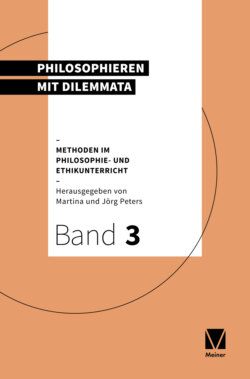Читать книгу Philosophieren mit Dilemmata - Группа авторов - Страница 24
На сайте Литреса книга снята с продажи.
Endnoten
Оглавление1Vgl. Lind, Georg: Ist Moral lehrbar? Ergebnisse der modernen moralpsychologischen Forschung, Logos Verlag, Berlin 2002.
2Vgl. Hartshorne, Hugh; May, Mark A.: Studies in the Nature of Character, 3 Vols., Vol. 1: Studies in deceit, Book one and two, The Macmillan Company, New York 1928.
3Vgl. Leming, James S.: »Tell me a Story: An Evaluation of a Literature-based Character Education Program«, in: Journal of Moral Education 29, 2000, S. 413 – 427.
4Vgl. Blatt, Moshe; Kohlberg, Lawrence: „The Effect of Classroom Moral Discussion upon Children's Level of Moral judgment“, in: Journal of Moral Education 4, 1975, S. 129 – 161.
5Vgl. Lind, Georg: Ist Moral lehrbar? Ergebnisse der modernen moralpsychologischen Forschung, a.a.O.
6Lipsey, Mark W.; Wilson, David B.: „The Efficacy of Psychological Educational and Behavioral Treatment Confirmation From Meta-Analysis“, in: American Psychologist 48, 1993, Issue 12, S. 1181 – 1209.
7Kohlberg, Lawrence: »The Just Community Approach to Moral Education in Theory and Practice«, in: Berkowitz, Marvin W.; Oser, Fritz (Hrsg.): Moral education: Theory and application, Erlbaum, Hillsdale, NJ. 1985, S. 27 – 87: S. 33.
8Ibid.
9Oser, Fritz; Althof, Wolfgang: „Die Gerechte Schulgemeinschaft: Lernen durch Gestaltung des Schullebens“, in: Edelstein, Wolfgang; Oser, Fritz; Schuster, Peter (Hrsg.): Moralische Erziehung in der Schule: Entwicklungspsychologie und pädagogische Praxis, Beltz Pädagogik, Beltz Verlag, Weinheim/Basel 2001, S. 233 – 268: S. 250 – 251.
10Vgl. Lind, Georg: Moral ist lehrbar. Wie man moralisch-demokratische Kompetenz fördern und damit Gewalt, Betrug und Macht mindern kann. Mit Diskussionstheater, Logos Verlag, Berlin 2019 (erweiterte und neu bearbeitete Auflage).
11Vgl. ibid.
12Vgl. den Ablaufplan am Ende dieser Studie.
13Simmel, Georg: Gesamtausgabe, 24 Bde., Bd. 3: Einleitung in die Moralwissenschaft, Bd. 1, hrsg. von Ramstedt, Ottheim, stw 803, Suhrkamp Taschenbuch Verlag, Frankfurt 1989, S. 153.
14Walker, Lawrence J.: »Cognitive Processes in Moral Development«, in: Sapp, Gary L. (Hrsg.): Handbook of Moral Development: Models, Processes, Techniques, and Research, Religious Education Press, Birmingham, AL 1986, S. 109 – 145.
15König, Josef: »Konstanzer Methode der Dilemmadiskussion – ein neuer Ansatz. Interview mit dem Stabsabteilungsleiter FüS I General Robert Bergmann zum Verhältnis Lebenskundlicher Unterricht und ethisch – moralische Bildung der Soldatinnen und Soldaten«, in: Kompass. Soldat in Welt und Kirche, hrsg. vom katholischen Militärbischof für die Deutsche Bundeswehr, Ausgabe 05/2007, S. 8 – 11.
16Vgl. Hemmerling, Kay: Morality Behind Bars – An Intervention Study on Fostering Moral Competence of Prisoners as a New Approach to Social Rehabilitation, Peter Lang Verlag, Frankfurt 2014.
17Lind, Georg: „Diskussions-Theater – Eine Methode der Demokratieerziehung“, in: Lehren & Lernen 10, 2018, S. 24 – 33.
18Vgl. Lind, Georg: Moral ist lehrbar. Mit Diskussionstheater, a.a.O.
19Anmeldungen zur Ausbildung eines KMDD-Leiters bzw einer KMDD-Leiterin können unter https://www.uni-konstanz.de/ag-moral/ vorgeommen werden.
20Vgl. Lind, Georg: Ist Moral lehrbar? Ergebnisse der modernen moralpsychologischen Forschung, a.a.O. und vgl. Lind, Georg: Moral ist lehrbar. Mit Diskussionstheater, a.a.O.
21Vgl. ibid.
22Vgl. Lind, Georg: Moralerziehung auf den Punkt gebracht, Auf den Punkt gebracht, Bd. 3, Debus Pädagogik Verlag, Schwalbach 2017, und vgl. Lind, Georg: „Moralkompetenz. Eine Schlüsselqualifikation fürs Leben und Lernen“, in: Praxis Schulpsychologie, Heft 15, Oktober 2018, S. 4 – 5.
*Die 90 Minuten voll ausschöpfen, aber nicht überziehen. Keine Phase auslassen!
